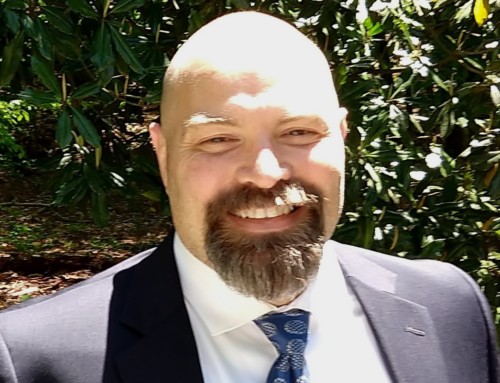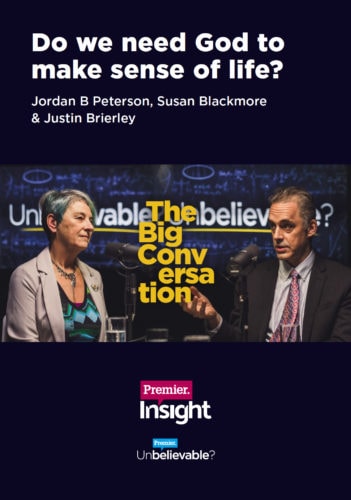
An anti-theist meets God: Jeff Dockman’s surprising story
Posted:Jana Harmon, host of the SIDE B Podcast with a PhD research in adult conversion, tells the story of how Jeff Dockman came to embrace Christianity after opposing it.
Hostility
Jeff once held a strong atheist identity and wore a set of military dog tags that read ‘atheist,’ furious that his commanding officer insisted on changing it to ‘no preference.’ He was once strongly offended at the idea of Christianity, taking pleasure in ridiculing the moralizing religious right.
What shaped this level of contempt and his stalwart resistance? More than that, what breached his walls and opened him to eventually change sides towards that which he once despised? What did it take for him to become a Christ follower?

Rebelling
Jeff grew up in a nominally Catholic faith, occasionally going to church on Christmas or Easter, or saying a prayer at the dinner table when relatives were in town. His parents “were nominally religious in that we said our prayers at night, but it wasn’t really meaningful to anybody. It is just what we did.” Essentially, he “was raised without any type of faith.”
After his parents divorced, Jeff moved in with his father and became interested in spiritualism through reading books in the fantasy and mythology genre, but soon left that behind along with his childhood. His negative ‘pocket definition of what a Christian is’ came through hearing one church sermon from a ‘crazy fire and brimstone holy roller’ preacher.
He began caricaturing the extreme of Christianity as normal and his antagonism grew. As a teen, he also learned of his mother’s personal angst against religion, having been rejected by the church as a divorced woman. It fit into his understanding of Christians as prejudiced, unwelcoming, and hateful. By age 16, he had developed a strong anti-Christian identity, reinforced by his friends:
“My friends were into punk rock scenes and wiccans and Satanists and a lot of drugs, and that’s when I started developing this identity of anti-Christian. I saw all of the people around me living as if there was no God, that’s when I decided I didn’t believe it and there was really no need for me to really think about it. For me, eventually it became anti-Christian. My friends had an identity and I wanted to be with my peer group, and it is what I believed. Being with other people and experiencing their beliefs and practices shaped my view and helped me to see what I really already believed.”
Jeff also wanted to make free moral choices apart from authoritarian voices, to live life in whatever way he wanted:
“At the time, I was against people who were trying to impose how I should live my life. You have these vague notions that there is this big concerted movement to make your life miserable and impose all of these restrictions. For me, God was a man-made construct and it was a mechanism for controlling people and it was a crutch for people that were weak and needed to believe in something. But from an ‘eat, drink, and be merry for tomorrow we die’ mindset, it was ‘this life is all you get’ so do what you can with it to enjoy yourself. I still had vague thoughts that there were limits, although you could argue about what hurting other people meant. I didn’t really have a problem with stealing from people at the time. I didn’t really have a problem with emotionally damaging people. Live your life however you want. In my culture, hedonism was a driving motivation, particularly for guys. It was very attractive.”
He also thought religious people were “unscientific”.
Religious belief was just unevolved thought that unscientific people had. It wasn’t as if I had this really deep understanding of scientific principles to say, ‘Well, this is why we don’t believe in God.’ It was a generalized, ‘Well, we know about evolution and we know about the formation of the universe’ and all these things. So, why do we need to talk about God?
The Change
Jeff’s cumulative justification for atheism seemed unshakeable. What, then, was the catalyst that turned Jeff in another direction?
Out of high school, Jeff recalls two significant encounters with religious people which began to dismantle his prior negative stereotypes. The first was after he joined the military and served alongside a religious man whom he and his friends would mock, yet he saw something genuine and attractive in his religious devotion.
The second occurred when another religious man knocked on his door to talk about the bible. Despite Jeff’s aggressive manner, the visitor remained calm and then left. This measured response impressed him. But, more than that, the man returned two weeks later with answers to the Jeff’s prior questions. In response to the diligent effort, Jeff took this ‘stack of papers’ and disinterestedly threw them away. Later, however, he recounts this experience as pivotal:
“It started breaking down those walls and caused me to reconsider what I had thought of people of faith…They believe it enough to come after someone who is clearly not even interested at the time. I think that is what shaped me the most. In my mind, they were living out their faith. Their faith said, ‘This is what you do’ and that is what they were doing in spite of the fact that I was a jerk about it.”
This kind of devoted faith didn’t align with the Christian hypocrisy he had witnessed earlier in his life.
Another step towards openness came when his wife started going to church and taking his children. Having grown up in a Christian home, she wanted their children to be raised with faith, but he rebuffed her desire as ‘stupid’, causing ‘a lot of tension’. However, Jeff became introduced to others who seemed to take their religious beliefs seriously. After their daughter was born, they became friends with a young Christian family who “put their faith into practice. Although they had specific opinions, they did it in a non-judgmental way. That was attractive about that family.”
In the meantime, he began working with two men who held opposite beliefs – one who was ‘very atheistic’ and fed into Jeff’s own religious antagonism and another who was a committed Christian whose life, along with other Christians he was meeting, began to draw him towards belief because of the quality of their lives.
“It wasn’t an in-your-face Christianity, but it was a silent witness and how they lived, how they behaved, and how they interacted with people. They don’t curse. They don’t go out drinking. They aren’t rude in their humor. They were not being judgmental when they were willing to have conversations about things. They seemed to have a very balanced view and to be very genuine people. But I think mostly what I noticed was a lack of crudeness. Within my circles it was all very crude, dirty humor, bad language and all of that. Even the music I listened to it was very much angry and loud, obnoxious, in your face, and derogatory. Their lives, for me, was the draw.”
At the same time, Jeff was increasingly discontented in his own life. Although he was reaching personal and financial goals, he realized that it didn’t brong the satisfaction that he expected. He began to question his atheist identity, especially after his atheist work colleague moved away, allowing him to consider other options. He began thinking about God, having deeper conversations with his Christian work colleague, asking questions about the accuracy, historicity, and trustworthiness of the bible, and reading Evidence That Demands a Verdict which addressed those concerns.
Conversion
Meanwhile, Jeff’s wife was becoming more involved in church and Sunday mornings were particularly stressful. One Sunday, right as she was about to go to church, he unexpectedly decided to go with her. Surprised by the sermon, he remembered thinking, “How does he know that I am here? Did he tailor this just for me?” Thereafter, he began going every week with his family. His prior caricatures were replaced by ‘real experience with real Christians’, giving him another reason to seriously consider Christianity.
Finally, one day on a lunchtime walk, Jeff began appreciating the beauty of creation prompting belief in God. He began studying the Bible and his confidence in God’s existence grew, but he still wasn’t quite ready to claim Christianity as his own. Doubt fuelled his desire to look for evidence and answers.
Through continued study of the bible and apologetics, he began to ‘see how the story as a whole ties together,’ decided that it ‘made sense’, and ‘came to a more convinced faith.’ It was not a moment in time, but rather a very long process. He “wanted to be convinced, but not to the point that I would say that I am going to ignore inconsistencies, or I am going to ignore things that I disbelieve. I didn’t want to be convinced that badly.”
Through his study, he was most impacted towards belief by the early Christians’ willingness to die for what they believed they saw, for what they believed was true. But, he also wanted to make sure he had adequately investigated other religions before he fully committed as a Christian. Going through that process “solidified my view that Christianity is true and that it best explains the world that we live in. It best explains the condition of my heart and my character and my needs and who I was as a sinful person and what I needed from God. That’s the only thing that explains that.”
At the time of his conversion to Christianity, Jeff was 29 years old. As time went on he became more convinced and confident that the Christian worldview was true and relevant. Yet, his desire to continue pursing truth continues. In looking back at his atheism, he reflected,
“I was not an analytical atheist. I know far more now, even about the atheist perspective than I knew then. And, I have given more time towards understanding why atheists believe what they believe, what their rationale is for a particular argument than I ever did as an atheist. It was just an identity. And now I find myself, it is a commitment in my mind to understand what I believe. And I view it as a lifelong commitment. I don’t think there is a stopping point when you get there. I think our whole lives, we are going to be seeking after God and that means looking at arguments for and against; otherwise, how are you going to know? How are you going to know that that is what you really believe unless you are willing to let yourself be challenged? It is for me a lifelong thing, to keep looking.”
As we left the restaurant, I considered Jeff’s story as yet another example of the complexity and ‘moving parts’ within someone’s life – circumstances, attitudes, encounters, ideas, community, and texts – all influencing in different ways at different times to produce significant perspective and life change in someone’s life. It demonstrates a process over time and remarkable conversion from one view of God, the world, others, and self to a nearly polar opposite understanding and living.
If you’d like to listen to Jeff tell his story, tune into the SIDE B Podcast with Jana Harmon, Ep. 29, dated 26 November, 2021: “Anti-Theist Surprised by God – Jeff Dockman’s Story”
Jana Harmon hosts the Side B Stories podcast where former atheists talk about their turn from disbelief to belief in God and Christianity. She is a Teaching Fellow for the C.S. Lewis Institute of Atlanta and former adjunct professor in Cultural Apologetics at Biola University where she received an M.A. in Christian Apologetics. Jana also holds a Ph.D. in Religion and Theology from the University of Birmingham in England. Her research focused on religious conversion of atheists to Christianity.
Want to learn more? Download your free, exclusive ebook: “Do we need God to make sense of Life” (featuring Jordan Peterson)
